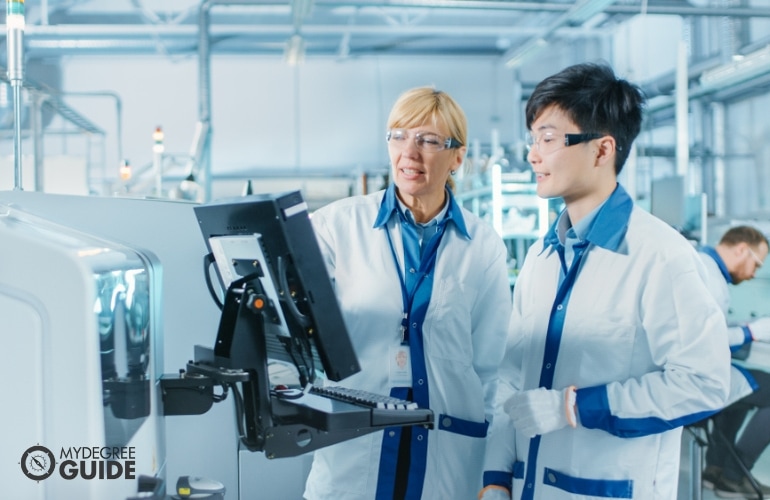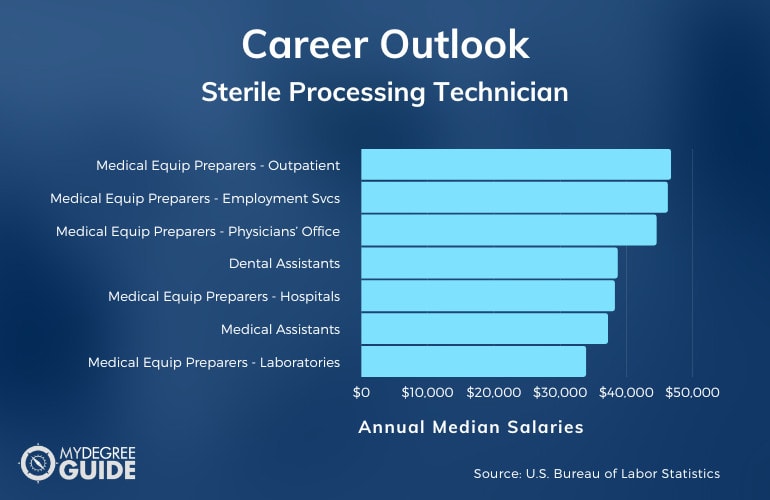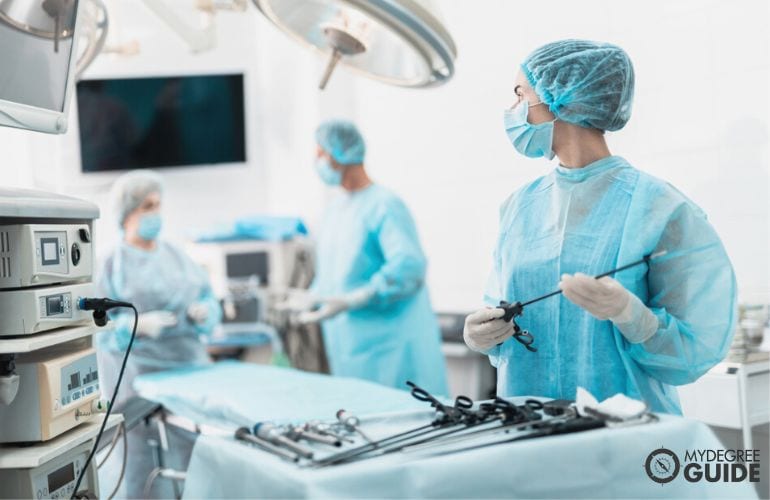If you have a passion for healthcare but don’t want to spend years in medical school, then you might consider enrolling in a sterile processing technician certificate program.

With a focused curriculum, these programs are designed to make students workplace ready. Online sterile processing technician programs are extremely flexible and can be completed in less than 1 year. Some can even be completed in as little as a single semester.
Editorial Listing ShortCode:
Read on to discover how a certificate in sterile processing can help you work toward a promising new career.
Universities Offering Online Sterile Processing Technician Certificate Programs
Methodology: The following school list is in alphabetical order. To be included, a college or university must be regionally accredited and offer degree programs online or in a hybrid format.
College of DuPage
College of DuPage offers a Central Sterile Processing Distribution Technician Certificate. The certificate requires a total of 4 courses, one of which is a practicum course that provides hands-on training in a hospital or surgery center. The full program can potentially be completed in just 1 semester.
College of DuPage is accredited by the Higher Learning Commission.
Franklin University
Franklin University offers at Sterile Processing Technician Certificate that can be earned online. The program usually takes 2 to 3 months to complete. Those that earn the certificate typically pursue jobs in hospitals, clinics, and other healthcare settings. Potential courses include Professionalism in Allied Health, Introduction to Human Anatomy and Medical Terminology, and Sterile Processing.
Franklin University is accredited by the Higher Learning Commission.
Miami Dade College
Miami Dade College offers a Career Technical Certificate to become a Central Sterile Processing Technician. Classes may be taken in the evening or on weekends, and students can typically finish in 1 year or less. The curriculum is designed to prepare students for the CSPDT certification exam. This is a full-time program.
Miami Dade College is accredited by the Southern Association of Colleges and Schools Commission on Colleges.
Midlands Technical College
Midlands Technical College offers a Sterile Processing Technician Certificate. Potential courses include Anatomy and Physiology, Medical Terminology, and Sterile Processing Technology. The first two courses may be taken online, and the last is on-campus only. Students may register for courses in this certificate program without applying to the college.
Midlands Technical College is accredited by the Southern Association of Colleges and Schools Commission on Colleges.
Yakima Valley College
Yakima Valley College’s Sterile Processing Technician Certificate program accepts a cohort of 10 students each fall quarter. Students must complete 19 credits, including online coursework, an on-campus lab, and a 400 hour clinical externship. The program can typically be finished in 6 months. The curriculum is designed to prepare students for the National Certification Exam.
Yakima Valley College is accredited by the Northwest Commission on Colleges and Universities.
Online Sterile Processing Technician Certificate Programs

Safe and effective medical procedures aren’t possible without sterile processing technicians. These healthcare professionals are a critical component of successful medical operations and surgeries.
Earning a sterile processing technician certificate is an strategic step toward taking on this role. Sterile processing technician schools provide fundamental knowledge that can help you qualify for entry-level healthcare positions.
Over the course of such a program, you can expect to study subjects like:
- Decontaminating medical equipment and instruments
- Complying with laws and regulations
- Identifying types of equipment and instruments for patient care
- Safely storing and distributing inventory
- Properly documenting processes
- Using medical and surgical terminology
Some programs offer students the opportunity to gain real-world experience in sterile processing. During a clinical externship, you could get the chance to work alongside professional mentors who offer hands-on guidance with actual patients.
Many sterile processing technician certificate programs also help you prepare for certification exams, like the Certified Registered Central Service Technician (CRCST). Industry certification is an optional but advantageous credential.
The combination of classroom and workplace training helps you to build the necessary skillset to flourish in a sterile processing technician position. Professionals in this role are responsible for cleaning, decontaminating, and assembling medical equipment, supplies, and instruments.
After becoming a certified sterile processing technician, you may be well-positioned to seek out positions with a wide range of employers. All healthcare organizations involved with direct patient care need professionals with expertise in properly handling and sterilizing equipment.
The most common healthcare organizations that hire sterile processing technicians include:
- Surgical centers
- Emergency rooms
- Dental offices
- Labor and delivery units
- Intensive care unit
- Plastic surgery offices
- Clinics
Many employers do not require candidates to have a certificate in hand to apply for a position, but completing a sterile technician program could make you more marketable. It also helps you perform high-quality work once you have been hired.
Technicians who excel in the workplace may also have the opportunity to advance to leadership positions. Some go on to manage a team of technicians, while others take on roles in more complex environments, such as chemical or biological laboratories.
Sterile Processing Technician Careers & Salaries

Earning a sterile processing technician certificate may help you qualify for a variety of positions within the healthcare system.
Sterile processing technicians are vital for any organization that serves patients, so you may find opportunities with a large pool of employers. According to the Bureau of Labor Statistics, positions for sterile processing technicians and similar healthcare roles pay competitive salaries for entry-level positions.
| Careers | Annual Median Salaries |
| Medical Equipment Preparers — Outpatient Care Centers | $46,700 |
| Medical Equipment Preparers — Employment Services | $46,220 |
| Medical Equipment Preparers — Physicians’ Offices | $44,530 |
| Dental Assistants | $38,660 |
| Medical Equipment Preparers — General Medical and Surgical Hospitals | $38,230 |
| Medical Assistants | $37,190 |
| Medical Equipment Preparers — Medical and Diagnostic Laboratories | $33,880 |
| Medical Equipment Preparers — Dentists’ Offices | $30,100 |
| Orderlies | $29,990 |
| Pharmacy Aides | $29,930 |
Graduates of these programs tend to go on to become sterile processing technicians, also known as medical equipment preparers. Others may use this certificate in their pursuit of higher education. Current healthcare professionals, such as medical or dental assistants, may earn this certificate to complement or advance their current responsibilities.
The Bureau of Labor Statistics reports that medical equipment preparers are expected to see 6% job growth over the next ten years. Healthcare occupations overall are expected to see 13% job growth.
Sterile Processing Technician Certificate Curriculum & Courses

The goal of a sterile processing certificate program is to prepare you to immediately enter the workplace. While no two programs are identical in terms of curriculum, most include a number of courses similar to the following:
- Principles and Practices of Sterile Processing: In this class, you’ll learn the basic functions of sterile processing departments, including safety standards.
- The Roles of Healthcare Professionals: In this course, you’ll learn about the various jobs within healthcare organizations.
- Medical and Surgical Terminology: This class focuses on the key terminology that sterile processing technicians and other healthcare professionals use on a day-to-day basis.
- Surgical Instruments: In this course, you’ll learn about the many kinds of surgical instruments that medical professionals use during surgical procedures.
- Medical Equipment: This course explores how to maintain and manage essential medical equipment, with a focus on disinfecting and cleaning.
- Microbiology and Infection Control: In this class, you’ll learn about topics like microorganism classification, identification, and transmission and infection prevention.
- Documentation Process: This class focuses on the practice of creating clear and detailed documentation of the sterilization process.
- Healthcare Law and Ethics: This class centers on laws and regulations that exist within the healthcare industry and offers students guidance on maintaining compliance.
- Decontamination Procedures and Practices: In this course, you’ll learn the techniques to clean, disinfect, and decontaminate medical instruments.
- Sterile Storage and Distribution: You’ll explore the principles of inventory management and storage, including replenishment systems, automated tracking systems, and surgical case cart systems.
Some certificate programs only consist of 5 courses, though some offer more. You can take a look at the course lists for each of your prospective programs to get a preview of their curriculum.
Admissions Requirements

To enroll in a sterile technician program, it’s necessary to have a high school diploma or GED. Other common admissions criteria include:
- Transcripts. You’ll provide your official high school transcripts.
- Test scores. Some schools require a minimum ACT, SAT, or placement test score, while others do not.
- Official application. You may complete separate applications for the school and program.
- Application fee. A fee is commonly required to submit an application.
Once you are accepted into a sterile processing technician program, you may also be asked to complete a drug test or criminal background check.
Sterile Processing Technician Programs Accreditation

Accreditation is an essential feature of an academic program. After undergoing a thorough process of assessment, a college or university can gain an accreditation status to demonstrate that they offer a high level of academic quality.
Regional accrediting organizations have especially rigorous standards, so it’s especially beneficial to attend a regionally accredited school. Plus, students can often transfer credits from accredited programs more easily, which is essential if you choose to pursue further degrees or change programs in the future.
Accreditation can also benefit your future career. Employers generally look more favorably on sterile processing technician certificates from regionally accredited schools.
Central Sterile Processing Technician Licensure and Certifications

Earning a sterile processing technician certification can be very beneficial. Here are some popular options:
- Certified Registered Central Service Technician (CRCST): This introductory certification requires 400 hours of hands-on experience and a passing exam score.
- Certified Sterile Processing and Distribution Technicians (CSPDT): To receive this introductory certification, candidates must show work experience or education and pass an exam.
- Certified in Sterile Processing Management (CSPM): Current or future professionals in healthcare sterilization leadership can earn certification with a history of full-time work experience and an accepted exam score.
Having a certification often gives candidates a competitive edge when applying for jobs.
Financial Aid and Scholarships

Before enrolling in a sterile processing technician certificate program, you can research available financial aid opportunities to help reduce the upfront cost of your studies.
Most students start by completing the Free Application for Federal Student Aid (FAFSA), which determines whether you are eligible for federal aid. Some states may also offer separate aid programs. If you are currently working in the healthcare field, your employer may offer a tuition assistance or reimbursement program. You can inquire with your supervisor or human resources department to learn more.
Scholarships are another source of aid for many students. You can research available scholarship programs that are intended for your career and educational goals. There are also others based on academic merit or designed for specific groups, like minority students or first-generation college students. The financial aid office at your prospective school can also serve as a resource if you are struggling to locate funding.
What Can You Do with a Sterile Processing Technician Training Certificate?

Graduates of sterile processing technician training certificate programs are well-qualified to work in a number of healthcare facilities, including hospitals, dental offices, and clinics. This certificate program is specifically designed for those who want to pursue a career as a surgical processing technician.
Some graduates may take on similar roles, though, such as medical assistants, dental assistants, and orderlies. Sterile processing technician positions pay competitive salaries, particularly considering that they don’t typically require applicants to have a college degree. According to the Bureau of Labor Statistics, the median annual salary for medical equipment preparers is $38,220.
Some graduates of sterile processing programs decide to further their educations and pursue an on-campus or online health services degree program.
How Long Is a Sterile Processing Technician Certificate Program Online?

Depending on your circumstances, earning an online sterile processing technician certificate could take less than 6 months.
Many programs are self-paced, which means that students can choose when to submit assignments and exams and work around their other commitments. For students who are able to devote several days a week to their studies, it may be possible to complete a certificate program within 4 months. Others with more limited availability may need up to 9 months to finish the program.
Is a Sterile Processing Tech Certificate Worth It?

Yes, a sterile processing tech certificate is worth it for many students. These programs are often affordable, can be completed on a flexible schedule, and provide a strong background for a healthcare career. Sterile processing technicians are essential to the medical field, so opportunities exist at many organizations.
Potential employers include hospitals, health clinics, and dental offices. Many relevant positions for sterile processing technicians are growing at rates that are steady or faster than average. According to the Bureau of Labor Statistics, the projected growth rate for medical equipment preparers over the next ten years is 6%.
Getting Your Sterile Processing Technician Certificate Online

If you aspire to work in healthcare and want to earn a valuable credential in a short period of time, then completing a sterile processing technician certificate online may be a strategic option.
During this type of program, you can learn vital skills that you can immediately transfer to the workplace. A certificate program can help you qualify for sterile processing technician positions, and it can also help you prepare for industry certification. These credentials could demonstrate your skill sets to potential employers.
To get started on your journey toward becoming a sterile processing technician, you can begin researching accredited schools that offer online certificate programs in this specialty.
